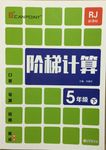题目内容
I _____ in New York for two years, but I’ve never regretted my final decision to move back to my motherland.
A. worked B. was working C. have worked D. had worked
A
解析:
主要测试动词时态。由具体语境中:but I've never regretted my final decision to move back tomy motherland可知:我在纽约上班属于过去的动作,所以使用一般过去时:worked 。

 阶梯计算系列答案
阶梯计算系列答案Alia Sabur, from Northport, N. Y., US, went to college at age 10. And four years later, Sabur became a bachelor of science in. Applied Mathematics summa cum laude(以最优等成绩)from Stony Brook University -- the youngest female in US history to do so. Her education continued at Drexel University, where she earned a Master of Science and a Doctor of Philosophy (哲学博士) in Materials Science and Engineering.
With an unlimited future ahead of her, Sabur directed her first career choice to teaching. "I really enjoy teaching," she said. She was three days short of her 19th birthday in February, 2008, when she was hired to become a professor at Konkuk University in Seoul, Korea. This distinction made her the youngest college professor in history, according to the Guinness' Book of Worm Records, beating the previous record held by Colin Maclaurin, a student of Isaac Newton, in 1717.
Although she doesn't start until next month, Sabur has taken up teaching math and physics courses at Southern University in New Orleans. Sabur is old enough to teach in the city, but not to join her fellow professors in a bar after work. In Korea, where the drinking age is 20, she might have more luck. In traditional Korean culture, children are considered to be 1 year old-when they are born, and add a year to their age every New Year instead of their actual birthday, so in Korea Sabur is considered 20.
On top of her unprecedented (空前的) academic achievements, Sabur has a black belt in Tae Kwon Do (跆拳道黑带). She is also a talented clarinet (竖笛) player who has performed with musicians like Lang Lang and Smash Mouth. So is there anything Sabur can't do?
【小题1】We can learn from the passage that Sabur is ________.
| A.America's youngest bachelor of science |
| B.Drexel University's youngest student |
| C.the world'syoungest college professor |
| D.the world's youngest female teacher |
| A.fourteen | B.eighteen | C.nineteen | D.twenty |
| A.Sabur might be permitted to drink in a Korean bar. |
| B.Sabur would be allowed to attend parties in Korea. |
| C.Sabur is old enough to teach at Konkuk University. |
| D.Sabur is lucky to be hired by Konkuk University. |
| A.Alia Sabur is the youngest female doctor from Stony Brook University. |
| B.Colin Maclaurin has once been the youngest college professor in the world. |
| C.In Korea, Alia Sabur is not allowed to drink for she is still underage. |
| D.Alia Sabur knows anything but Tae Kwon Do. |
Alia Sabur, from Northport, N. Y., US, went to college at age 10. And four years later, Sabur became a bachelor of science in. Applied Mathematics summa cum laude(以最优等成绩)from Stony Brook University -- the youngest female in US history to do so. Her education continued at Drexel University, where she earned a Master of Science and a Doctor of Philosophy (哲学博士) in Materials Science and Engineering.
With an unlimited future ahead of her, Sabur directed her first career choice to teaching. "I really enjoy teaching," she said. She was three days short of her 19th birthday in February, 2008, when she was hired to become a professor at Konkuk University in Seoul, Korea. This distinction made her the youngest college professor in history, according to the Guinness' Book of Worm Records, beating the previous record held by Colin Maclaurin, a student of Isaac Newton, in 1717.
Although she doesn't start until next month, Sabur has taken up teaching math and physics courses at Southern University in New Orleans. Sabur is old enough to teach in the city, but not to join her fellow professors in a bar after work. In Korea, where the drinking age is 20, she might have more luck. In traditional Korean culture, children are considered to be 1 year old-when they are born, and add a year to their age every New Year instead of their actual birthday, so in Korea Sabur is considered 20.
On top of her unprecedented (空前的) academic achievements, Sabur has a black belt in Tae Kwon Do (跆拳道黑带). She is also a talented clarinet (竖笛) player who has performed with musicians like Lang Lang and Smash Mouth. So is there anything Sabur can't do?
1.We can learn from the passage that Sabur is ________.
|
A.America's youngest bachelor of science |
|
B.Drexel University's youngest student |
|
C.the world'syoungest college professor |
|
D.the world's youngest female teacher |
2.When Sabur was hired as a professor, her actual age is ________.
|
A.fourteen |
B.eighteen |
C.nineteen |
D.twenty |
3.What does the author mean by saying "she might have more luck" (in Paragraph 3)?
|
A.Sabur might be permitted to drink in a Korean bar. |
|
B.Sabur would be allowed to attend parties in Korea. |
|
C.Sabur is old enough to teach at Konkuk University. |
|
D.Sabur is lucky to be hired by Konkuk University. |
4.According to the passage, which of the following is TRUE?
|
A.Alia Sabur is the youngest female doctor from Stony Brook University. |
|
B.Colin Maclaurin has once been the youngest college professor in the world. |
|
C.In Korea, Alia Sabur is not allowed to drink for she is still underage. |
|
D.Alia Sabur knows anything but Tae Kwon Do. |